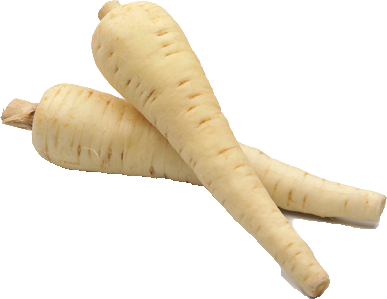|
Generally,
parsnip contains more sugar than carrots, radish, and turnips. In general, it
has calories (100 g provide 75 calories) comparable to that of some fruits like
banana, grapes etc. Nonetheless, its sweet, juicy root is rich in several
health-benefiting phyto-nutrients, vitamins, minerals, and fibre.
It is one of the
excellent sources of soluble and insoluble dietary fibre. 100 g root provides
4.9 mg or 13% of fibre. Adequate fibre in the diet helps reduce blood
cholesterol levels, obesity and constipation conditions.
As in carrots and
other members of apiaceae family vegetables, parsnip too contains many poly-acetylene
anti-oxidants such as falcarinol, falcarindiol, panaxydiol, and
methyl-falcarindiol.
Several research
studies from scientists at University of Newcastle at Tyne found that these
compounds have anti-inflammatory, anti-fungal, and anti-cancer function and
offer protection from colon cancer and acute lymphoblastic leukaemia (ALL).
Fresh roots are
also good in vitamin C; provide about 17 mg or 28% of RDA. Vitamin C is a
powerful water-soluble anti-oxidant, easily available to us from natural
sources. It helps body maintain healthy connective tissue, teeth, and gum. Its
anti-oxidant property helps protect from diseases and cancers by scavenging
harmful free radicals from the body.
Further, the root
is rich in many B-complex groups of vitamins such as folic acid, vitamin B-6
(pyridoxine), thiamin, and pantothenic acid as well as vitamin K and vitamin E.
In addition, it
also has healthy levels of minerals like iron, calcium, copper, potassium,
manganese and phosphorus. Potassium is an important component of cell and body
fluids that helps controlling heart rate and blood pressure by countering
effects of sodium.
Heart Health: Everyone seems to be looking for the big secret to unlocking a
healthy cardiovascular system, and while fruits and vegetables are always a
good choice, parsnips make an even bigger impact than usual, given the high
level of potassium, which acts as a vasodilator and reduces blood pressure, as
well as stress on the heart. The high levels of folate in parsnips is the
perfect complement, as it reduces homocysteine levels in the blood, which are
associated with a higher risk of heart disease.
Dietary Fibre: Parsnips have been praised for their high fibre content for
many years, particularly because it is composed of soluble fibre, the variety
that is closely associated with reducing cholesterol levels (further boosting
heart health) and with a lower chance of developing diabetes. On top of that,
dietary fibre is a key component of our digestive process, facilitating healthy
movement of food through the digestive tract, a reduction in constipation, and
the prevention of other gastrointestinal disorders.
Birth Defects and
Metabolism: While folate was already mentioned in
conjunction with a healthier heart, it is also important to note that folate (a
member of the B-vitamin family) is also connected with reducing neural tube
birth defects in infants and optimizing metabolic processes related to energy
production and your nervous system. Also, folate has been positively correlated
with lower levels of depression in those who regularly add it to their diet.
Weight Loss: As a low-calorie option with high levels of soluble fibre,
parsnips fill you up and prevent the release of ghrelin, which is a “hunger”
hormone. This can significantly reduce your likelihood of snacking between
meals and help you with your weight loss goals. Also, the optimized digestive
processes help you eliminate waste and get your nutrient uptake into peak
condition to get the healthiest nutrients from your food.
Immune System: Parsnips are also packed with antioxidant vitamins and organic
compounds that protect the body from foreign invaders, as well as toxic by-products
from our own cellular metabolism. Vitamin C and E act as antioxidants in the
body and eliminate or neutralize free radicals that can cause chronic diseases,
including cancer. Vitamin C also stimulates the production of white blood cells
to attack disease and foreign microbes in the body, in addition to functioning
as a key element in the production of collagen, which is a fundamental building
block of our body.
Growth and
Development: Although the content of protein isn’t impressively
high in parsnips, the full range of minerals and vitamins that parsnips boasts
means that it is an ideal snack or dietary addition because it can help to
balance diets that may suffer from unpredictability or nutrient deficiency.
Just as carrots are a great on-the-go snack, parsnips can similarly be a
healthy option, rather than potato chips and junk food.
|

